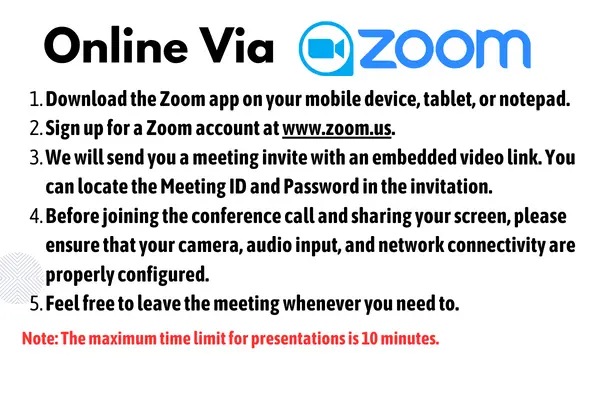Guidelines
Oral Presentation Instructions
Contributed oral presentations are 15 minutes long, including 5 minutes for questions and discussion. The paper must be presented by one of the author or co-authors. Oral presentations are to be made either using your laptop or the PC that will be available in the session room (Windows system + Power point). Please come to the session room with your laptop or pen drive having your presentation file. There will be a volunteer on hand to assist in starting each presentation.
Remote Presentation Instructions
If you are unable to join the conference due to an emergency situation, or if your English is not sufficient for a living presentation we advise the following solutions to you.
- You can sound record your ppt. presentation and send us. And in the conference day you can connect to the conference via Zoom/Skype. We will run your sound recorded .ppt presentation and you will answer the audience’ questions via Zoom/Skype.
- You can watch the video to get an idea about sound recorded ppt. presentations.
Poster Presentation Instructions
We don’t limit the size of poster but it should be not large enough to occupy more space than 5ft*2ft. You must provide your own printout of the poster itself. One of the paper author or co-authors must be present and available for discussion at the poster session. Posters will be on display in the conference room.
In the first instance, we require everyone who wishes to submit their work to the conference to submit an abstract describing the proposed paper, work in progress, presentation, etc. The abstract submission form will guide you through the process but we recommend you read the call for papers first to ensure you select the correct track and submission type.
Submitting an Abstract:
- The maximum word limit for the abstract is 350-500 words.
- Your submission should be submitted in English.
- We encourage you to send informative abstract (complete abstract) which is a compendious summary of a paper’s substance including its background, purpose, methodology, results, and conclusion.
- Please send in a brief biography together with the Abstract.
Submitting a Full Paper:
Prospective authors are invited to submit full text papers including abstract, keywords, introduction, methodology, result description, tables, figures, and references.
- Before submitting your paper, please ensure that it has been carefully read for typographical and grammatical errors. If English is not your first language, have your paper proof-read by an English speaking person. Papers will be returned if the standard of English is not considered to be good enough for publication.
- All submitted articles should report original, previously unpublished research results, experimental or theoretical.
- Articles submitted to the Conference should meet these criteria and must not be under consideration for publication elsewhere.
- Manuscripts should follow the style of the Conference and are subject to both review and editing.
Paper acceptance criteria:
Papers that do not contain an original research contribution will be rejected. Papers that are so badly written as not to be understandable will be rejected, as well as papers where authors engage in extensive self-plagiarism. All submitted papers will go through a double-blind reviewing process by at least two reviewers drawn from the chairs of committees.
Refunds:
No refunds will be issued for any reason. Please take this into consideration before complete the payment.

